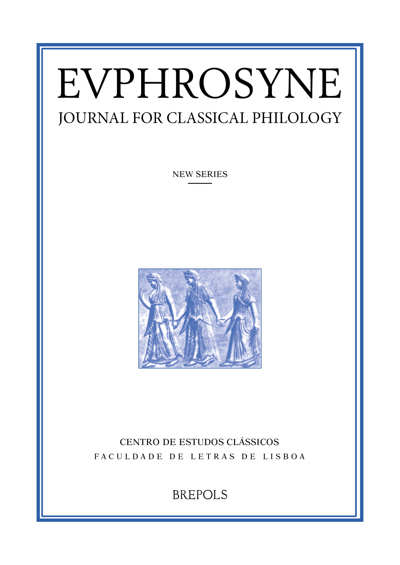
 Open Access
List of Publications
Open Access
List of Publications
Print ISSN: 0870-0133
Online ISSN: 2736-3082
Frequency:
1 issue/year
Method of peer review
double-blind undertaken by a specialist member of the Board or an external specialist
Keywords
Humanism, Late Antiquity, Medieval studies, Neo-Latin Humanism, Classical Tradition, Classical Reception (Nachleben), Classics, Greek language, Greek literature, Latin language, Latin literature, Antiquity, Greek culture, Latin culture, Byzantine studies
Accepted Language(s):
English, French, Italian, Spanish, Other
Available in Open Access
Euphrosyne: Journal for Classical Philology is an annual academic journal in Classics. The journal publishes original research articles that contribute to various fields within the broader scope of Classical Studies, including Greek and Roman literature, philology and culture; Byzantine and medieval culture and literature; and Neo-Latin Humanism and Classical Reception with emphasis on how Classical, Byzantine or medieval authors and themes have been transmitted through time (Nachleben).
Founded in 1957, Euphrosyne has been dedicated to promoting quality research for over half a century. Based in Lisbon, the journal prides itself on its strong international profile. It is commited to promoting innovative research, especially by promising early-career scholars, and encouraging fresh perspectives and scholarly dialogue across disciplines.
-
EDITORIAL BOARD
Director
Paulo Farmhouse Alberto (Universidade de Lisboa)
Editorial Board
Ana Gómez Rabal (institución Milá y Fontanals de Investigación en Humanidades – CSIC)
Fotini Hadjittofi (Universidade de Lisboa)
José Carlos Miralles Maldonado (Universidad de Murcia)
Rossana Guglielmetti (Universitá degli Studi di Milano)
Editorial Assistants
David Soares Mesquita (Universidade de Lisboa)
Joana Veiga (Universidade de Lisboa)
Vanessa Fernandes (Universidade de Lisboa)
-
AUTHOR INFORMATION
Main Language: English
Additional Languages: French, Italian, Spanish, Portuguese
Submissions
All submissions must be addressed to euphrosyne.ceclassicos@letras.ulisboa.pt. Before submitting, please ensure that your work does not exceed 15 pages (excluding the bibliography) and that it is formatted according to the Journal’s editorial guidelines (available for download via https://centroclassicos.letras.ulisboa.pt/wp-content/uploads/2024/11/Editorial-Guidelines_AUTHORS.pdf).
Peer Review
Euphrosyne’s evaluation system is structured in two rounds of assessment to which all submissions are subjected. The first round involves a preliminary review by the Editorial Board to determine if the paper falls within the scope of the journal and if its quality aligns with the expected standards. Approved submissions will then proceed to the second round, where they are subjected to double-blind peer review. During this stage, experts in the relevant fields assess the paper’s scholarly merit, originality, and contribution to the discipline. Reviewers are expected to evaluate articles impartially and provide constructive feedback for revision when necessary. Based on the feedback received, the paper may either be rejected or accepted for publication.
Euphrosyne’s peer review system includes a scoring mechanism designed to assess submissions across different categories. This scoring system ensures a comprehensive evaluation that promotes fairness and objectively determines whether a submission meets the Journal’s standards for publication. Peer reviewers will assess submissions in the following categories:- Originality and Significance: The novelty of the contribution and its importance within the field.
- Bibliographical Coverage: The author’s awareness of and engagement with relevant literature in the field.
- Clarity and Coherence: The logical flow and coherence of the contribution.
- Presentation: The quality of writing style, translations, citations, notes, etc.
- Alignment with the Journal’s Scope: The degree to which the submission aligns with the journal’s focus and objectives.
Ethics, Malpractice and Authorship Statement
https://www.brepols.net/ethics
Archival
All articles are digitally archived in Portico
-
RANKING & INDEXING
- Anvur
- Arts and Humanities Citation Index
- Brill Bibliographies
- Cabells
- CARHUS Plus
- Cengage
- Clarivate - Web of Science
- CIRC - Clasificación Integrada de Revistas Científicas
- Dialnet
- EBSCO
- ECOOM
- ERIHPLUS – European Reference Index for the Humanities and Social Sciences
- EZB
- Federation of Finnish Learned Societies
- HALL - Open Science
- IBHR - International Bibliography of Humanism and the Renaissance
- Index Religiosus
- IsisCB - Sources and Resources for the History of Science and Allied Fields (indexed on article level)
- L’Année Philologique
- Latindex
- MIAR – Matriz de Información para el Análisis de Revistas
- Mirabel
- MLA – Modern Language Association
- OCLC – Online Computer Library Center
- Open Alex
- ProQuest
- RILM - Répertoire International de Littérature Musicale (coverage 1981-1982)
- Scopus (coverage 2011-2016)
- SJR – Scimago Journal Rank
- Ulrichsweb
___
ANVUR Area 10 – Class A
ANVUR Area 10 – Scientific
ANVUR Area 11 – Scientific
CIRC - A Classification in Human Sciences & C Classification in Social Sciences)
Excellence of Research in Australia (ERA) journal list 2018, ARC